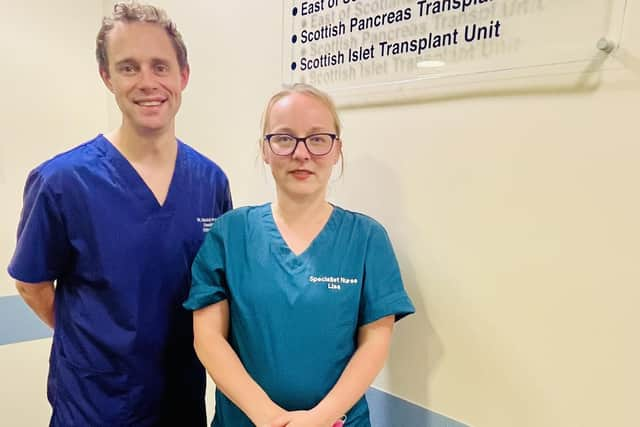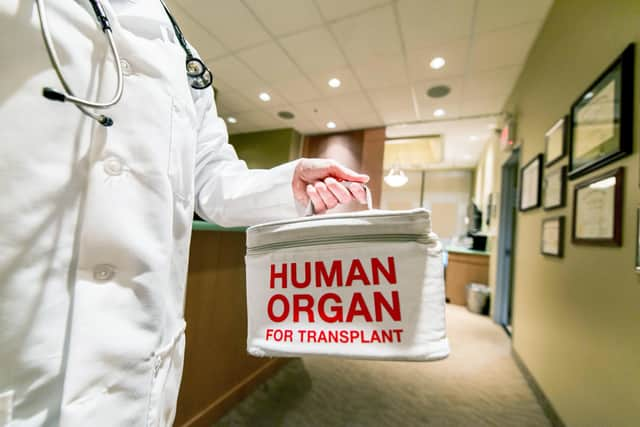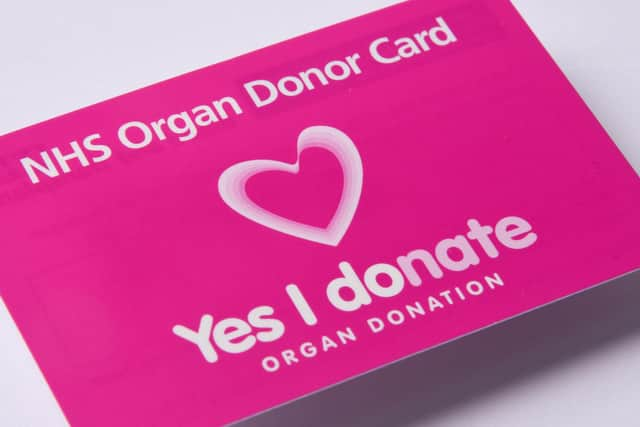Edinburgh organ donation: Doctor and nurse talk about their life-saving and life-transforming work
and live on Freeview channel 276
There are more than 500 people in Scotland on the waiting list for a transplant. And despite more than half of the population signing up on the Organ Donor Register, there are still not enough organs being donated to meet that need.
To mark Organ and Tissue Donation Week, a doctor and a nurse at the heart of Edinburgh's organ donation operations spoke about their work making sure as many people as possible get the chance of a new heart, lung, kidney or other organ.
Advertisement
Hide AdAdvertisement
Hide AdAlthough living donations are possible for livers and kidneys, the majority of transplants involve organs from people who have died. One donor can save or transform the lives of up to nine people. And over the past 12 months in Scotland, there were 295 transplants as a result of organ donations from 102 deceased patients.


But critical care consultant Dr Alastair Morgan, NHS Lothian clinical lead for organ donation, said: "Only one per cent of people die in circumstances that could result in solid organ donation. They need to be receiving invasive support – on a ventilator – either within an emergency department or Intensive Care Unit.
"Scotland traditionally has a high percentage of its population on the Organ Donation Register and Lothian is the area in Scotland with highest percentage – 63 per cent have signed up and expressed a wish to donate their organs.”
But a key message of Organ Donation Week is that people should also let their relatives know their wishes. Dr Morgan said: “No matter what your decision about organ donation, it's important to share that decision with your loved ones. There are many times when people have expressed their wishes by joining the Organ Donor Register but haven’t told their family or friends and when we've raised the fact that they would like to be considered for organ donation, it's sometimes quite difficult for the family to support that if they haven't been aware of it.
Advertisement
Hide AdAdvertisement
Hide Ad"It is a time in these people’s lives – the family, friends and relatives – when they are under an incredible emotional burden. And that’s one of the important reasons why we want people to talk about their organ donation decisions, so the family members don't feel we're putting that decision upon them at a time of great emotional distress.”


Dr Morgan said there were many reasons why people did not want to become organ donors. “And if you've had the correct information and you make that decision that upon your death you do not want to be considered that is absolutely okay.” But he said there were also misconceptions – sometimes people from ethnic minorities felt it was “against their religion or their culture”; sometimes people thought they could not be an organ donor because of their age or a medical condition. But Dr Morgan said: “We will consider anybody who has expressed a wish to be considered.”
Dr Morgan’s role, along with colleague Dr Oliver Robinson, is to champion and promote organ donation among hospital staff in Lothian to maximise the donation potential. And they work closely with the team of specialist nurses who liaise with staff in the regions intensive care units (ICUs) and with patients’ relatives and assess the suitability of potential donors.
Lisa MacKinnon has been doing the job for nine years – and before that, she was an intensive care nurse and worked at Newcastle’s Freeman Hospital in the transplant unit. So she knows both sides of organ donation in detail. “It’s what I saw at the Freeman that keeps me doing the job,” she said.
Advertisement
Hide AdAdvertisement
Hide Ad"There's a specialist nurse attached to almost every hospital in Scotland that has an ICU. We work very closely with the ICUs and speak to them every morning." If it is clear a patient is not going to survive, it is the specialist nurses’ task to assess whether they could be an organ donor – sometimes there is something in the patient’s current condition or medical history to rule them out straight away. But if not they will check to see whether the person is on the Organ Donor Register and have a conversation with the family.


"When we have the morning discussion with ICUs, they might mention three patients and of these, you may speak to one patient's family because the other two aren't suitable. Other times, you can go two or three days without any.”
Even if the patient has signed up on the register, there is still a legal “duty to enquire” which means asking the nearest relative if they know what the patient would want or if they might have changed their mind. Nurse MacKinnon said: “The relatives might say ‘We had conversation a few weeks ago and they wouldn't want that’. We support the family in whatever decision they make.”
The nurses also complete a medical questionnaire with a patient’s family and also with the patient's GP to check on any medical issues they might have had. “Someone might not go to their GP very often, but the family say ‘Oh, they had this wrong or that wrong’. Or patients might not discuss anything with their families, but the GP says ‘They visited us with this or that a couple of months ago’.”
Advertisement
Hide AdAdvertisement
Hide AdThey also examine medical notes and do blood tests. “When we've got all the information we need and all the blood tests we need, we can move to speaking to the transplant centres to see if there's any patients that would be suitable for the organs we think might be available. That often takes a number of hours because it's UK-wide."
Suitable donors don't always find a recipient – a whole range of factors including tissue type and blood group have to be considered. “It might just be be there are no recipients anywhere suitable for that organ.”
But when a suitable recipient is found, it’s up to Nurse MacKinnon and her colleagues to organise the teams of transplant surgeons to come and take the organs out. The teams could be from Edinburgh or Glasgow, but might also come from London, Newcastle, Manchester or another transplant centre. “We have to liaise with the theatre team – the operation has to fit in with the business of the hospital – and we have to liaise with ICU, with the family and with the retrieval surgeons, wherever they're coming from, and marry this all up to the point where we can take patient to theatre for the operation.”
And once the organ or organs are safely removed, the specialist nurses must make sure they get sent where they're meant to go. And it is all very time critical. A heart, liver or pancreas in particular must reach the recipient as quickly as possible. That means organising ambulances or special cars – and sometimes flights – to whisk the organs to their destinations. Nurse MacKinnon said flights can sometimes be difficult to organise. “Post Covid, sometimes airports shut earlier than previously so even though they’re special planes they can’t take off. Or if a pilot is waiting too long and goes over their hours, we have to get another pilot.”
Advertisement
Hide AdAdvertisement
Hide AdLast year, 96 patients in Lothian died in circumstances in which organ donation was considered; the families of 40 patients were approached and 31 of these agreed to organ donation. That resulted in 50 organs being donated, resulting in either life-saving or life-transforming surgery for 48 recipients.